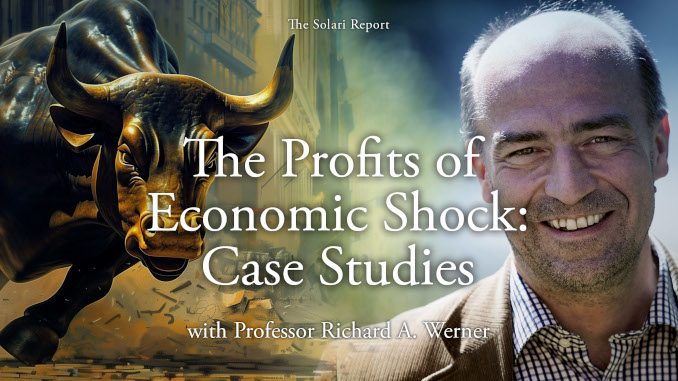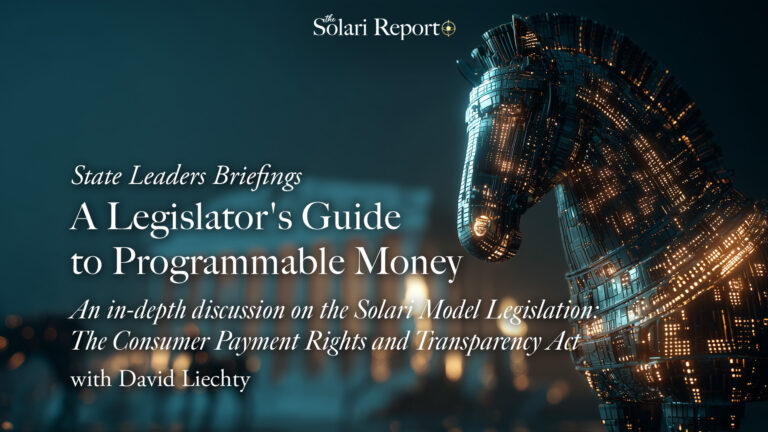
The Profits of Economic Shock: Case Studies with Professor Richard A. Werner
Become a member: Subscribe
- Money & Markets
- Weekly Solari Reports
- Cognitive Liberty
- Young Builders
- Ask Catherine
- News Trends & Stories
- Equity Overview
- War For Bankocracy
- Digital Money, Digital Control
- State Leader Briefings
- Food
- Food for the Soul
- Future Science
- Health
- Metanoia
- Solutions
- Spiritual Science
- Wellness
- Building Weatlh
- Via Europa
Solari’s Building Wealth materials are organized to inspire and support your personal strategic and financial planning.

Missing Money
Articles and video discussions of the $21 Trillion dollars missing from the U.S. government
No posts
- LATEST
- TOP SECTIONS
- SERIES
- Money & Markets
- Weekly Solari Reports
- Ask Catherine
- News Trends & Stories
- Equity Overview
- Cognitive Liberty
- Young Builders
- Building Wealth
- The War for Bankocracy
- Digital Money, Digital Control
- State Leader Briefings
- Food
- Food for the Soul
- Future Science
- Health
- Metanoia
- Solutions
- Spiritual Science
- Wellness
- Via Europa
- BLOGS
- RESOURCES
- COMMUNITY
- My Account
- Log In
- Subscribe
- Search
- Shop
- Support
- Donate
- Log Out
The Profits of Economic Shock: Case Studies with Professor Richard A. Werner

A Short Preview:
“You’re seeing a plan for basically how to financialize and make money
out of genocide and the destruction of society.”
~ Professor Michael Hudson

Already a subscriber? Log in
New to the Solari Report? Check out our Welcome Page
Not a subscriber yet? Subscribe now
With a Solari Report subscription, you get access to:
- ✔ The popular and informative Money & Markets show co-hosted by Catherine Austin Fitts and John Titus
- ✔ Weekly interviews with top guests, and quarterly deep dives into major trends affecting you day-to-day
- ✔ Aggregation of the most relevant news stories
- ✔ Subscriber-only events and a digital platform to connect with other subscribers
43 Comments
Comments are closed.
Our mission is to help you live a free and inspired life. This includes building wealth in ways that build real wealth in the wider economy. We believe that personal and family wealth is a critical ingredient of both individual freedom and community, health and well-being.
Nothing on The Solari Report should be taken as individual investment, legal, or medical advice. Anyone seeking investment, legal, medical, or other professional advice for his or her personal situation is advised to seek out a qualified advisor or advisors and provide as much information as possible to the advisor in order that such advisor can take into account all relevant circumstances, objectives, and risks before rendering an opinion as to the appropriate strategy.
Be the first to know about new articles, series and events.

43 Comments
-
Best interview I’ve ever seen on Solari.
-
Always helps to look at history through the prism of “how the money worked.”
-
-
Best interview I’ve ever seen on Solari.
-
Always helps to look at history through the prism of “how the money worked.”
-
-
I have worked for a Thai bank since 1999 and am very interested in the discussion about the financial crisis here. More than half of the major companies defaulted on their debts but fortunately after the crisis there wasn’t a fire sale of assets as the commercial banks and central bank worked together to keep companies afloat. There were new people running the central bank by that time. I checked to see who was the governor who put in place the disastrous policies mentioned. He was Vijit, Yale educated…surprise. He did come in for criticism for these Western inspired actions and their have been efforts to be more independent since. This article gives a bit of a summary
https://m.phnompenhpost.com/international/vijit-supinit-banker-behind-thailands-boom-years-
This is good to know Bronwen. So appreciate your insights.
-
-
I have worked for a Thai bank since 1999 and am very interested in the discussion about the financial crisis here. More than half of the major companies defaulted on their debts but fortunately after the crisis there wasn’t a fire sale of assets as the commercial banks and central bank worked together to keep companies afloat. There were new people running the central bank by that time. I checked to see who was the governor who put in place the disastrous policies mentioned. He was Vijit, Yale educated…surprise. He did come in for criticism for these Western inspired actions and their have been efforts to be more independent since. This article gives a bit of a summary
https://m.phnompenhpost.com/international/vijit-supinit-banker-behind-thailands-boom-years-
This is good to know Bronwen. So appreciate your insights.
-
-
To add to my comment, here is a quote from the article: “Although there were those who criticised the opening of the Bangkok International Financial Facility in 1993 as opening the channel for capital inflows, the ideas embodied in financial liberalisation were mainstream thinking that pervaded both regionally and the Washington Consensus thinking from the IMF and the World Bank”
-
To add to my comment, here is a quote from the article: “Although there were those who criticised the opening of the Bangkok International Financial Facility in 1993 as opening the channel for capital inflows, the ideas embodied in financial liberalisation were mainstream thinking that pervaded both regionally and the Washington Consensus thinking from the IMF and the World Bank”
-
Another great Solari interview and presentation. “Case Studies” was a fine subtitle which was a good reminder of their criminality and lies to revisit. I just purchased Princes Of Yen and look forward to reading.
Comments are closed.


















































































































Best interview I’ve ever seen on Solari.
Always helps to look at history through the prism of “how the money worked.”
Best interview I’ve ever seen on Solari.
Always helps to look at history through the prism of “how the money worked.”
I have worked for a Thai bank since 1999 and am very interested in the discussion about the financial crisis here. More than half of the major companies defaulted on their debts but fortunately after the crisis there wasn’t a fire sale of assets as the commercial banks and central bank worked together to keep companies afloat. There were new people running the central bank by that time. I checked to see who was the governor who put in place the disastrous policies mentioned. He was Vijit, Yale educated…surprise. He did come in for criticism for these Western inspired actions and their have been efforts to be more independent since. This article gives a bit of a summary
https://m.phnompenhpost.com/international/vijit-supinit-banker-behind-thailands-boom-years
This is good to know Bronwen. So appreciate your insights.
I have worked for a Thai bank since 1999 and am very interested in the discussion about the financial crisis here. More than half of the major companies defaulted on their debts but fortunately after the crisis there wasn’t a fire sale of assets as the commercial banks and central bank worked together to keep companies afloat. There were new people running the central bank by that time. I checked to see who was the governor who put in place the disastrous policies mentioned. He was Vijit, Yale educated…surprise. He did come in for criticism for these Western inspired actions and their have been efforts to be more independent since. This article gives a bit of a summary
https://m.phnompenhpost.com/international/vijit-supinit-banker-behind-thailands-boom-years
This is good to know Bronwen. So appreciate your insights.
To add to my comment, here is a quote from the article: “Although there were those who criticised the opening of the Bangkok International Financial Facility in 1993 as opening the channel for capital inflows, the ideas embodied in financial liberalisation were mainstream thinking that pervaded both regionally and the Washington Consensus thinking from the IMF and the World Bank”
To add to my comment, here is a quote from the article: “Although there were those who criticised the opening of the Bangkok International Financial Facility in 1993 as opening the channel for capital inflows, the ideas embodied in financial liberalisation were mainstream thinking that pervaded both regionally and the Washington Consensus thinking from the IMF and the World Bank”
Another great Solari interview and presentation. “Case Studies” was a fine subtitle which was a good reminder of their criminality and lies to revisit. I just purchased Princes Of Yen and look forward to reading.